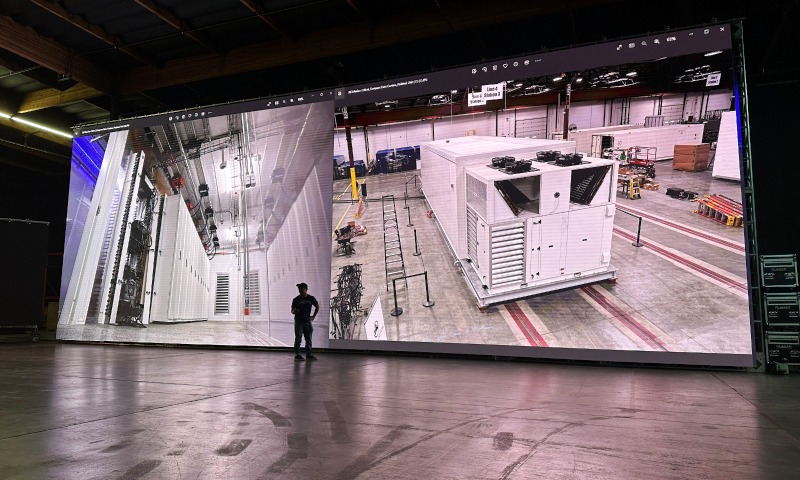Carrie Goetz, Principal/CTO, StrategITcom, and Amazon best-selling author of “Jumpstart Your Career in Data Centers Featuring Careers for Women, Trades, and Vets in Tech and Data Centers,” personifies over 40 years of global experience designing, running, and auditing, data centers, IT departments, and intelligent buildings. She is an international keynote speaker published in 69 countries in over 250 publications. She holds an honorary doctorate in Mission Critical Operations, RCDD/NTS, PSP, CNID, CDCP, CSM-Agile, and AWS CCP and is a Master Infrastructure Mason with 40+ certifications throughout her career. A member of Women Leading Technology Sorority. She champions STEM education through outreach projects and her podcast series.
Over the years, I have worked with transitioning military folks, their spouses, and most recently, children to introduce them to the mission-critical industry. Most recently, at an event in San Diego with about 350 registered transitioning veterans. Working with veterans throughout the years, some admit they transitioned well; some say they did everything wrong. One thing is sure; a few things will be different in the private sector. Many companies are competing for military talent. But few industries offer the depth and breadth of the data center industry. This industry currently has 300,000 open jobs that must be filled by 2025. While this is spectacular from an opportunity perspective, it’s only spectacular to those who know about the industry and its jobs. Quite frankly, that is the reason I wrote my book. Unfortunately, awareness of the data center industry, how they work, and where the jobs are is lacking.
I view diversity as fingerprints. Forget identity diversity; people are people. Any two people of any demographic will have unique needs concerning technology. Data centers and the mission-critical industry provide the heartbeat and resources for technology. Every single known digitally documented thing resides in at least one data center. As data centers contain our information, it makes sense that the industry talent should be comprised of various fingerprints to keep tech in check and ensure that it continues to meet our needs, not the other way around. While the internet, social media, and communications offer great promise, they can be dangerous in equal measure. We need guardians in and of technology, too. We need protectors. It’s a noble purpose.
It is rare for someone to seek out a job in the industry because of a college degree. In fact, most people my age fell into the industry as it didn’t exist in its current form. A significant number of people today still fall into the industry. Curricula haven’t kept up with the rapidly changing needs of data centers. Technology moves at the speed of life, college courses, not so much. We cannot have successful technology without guardians, innovation, and people from all backgrounds to watch the playground, so to speak.

While the industry is dubbed mission-critical, not all jobs work in the chaos of a mission-critical environment. But some certainly do. So, the first plan to transition into the industry is to sort out what you want to do in the private sector. Of course, part of that decision is how comfortable you are “being on your toes.” Indeed, many data center jobs will have some stress; not all will. So let’s discuss some of the sectors of the data center ecosystem.
To get started, the site selection process involves needs analysis, sustainability, site selection, real estate, power contract negotiations, telecommunications negotiations, and community liaisons. Then there are contract negotiations, legal, and construction project managers. After site selection, the construction phase kicks in. Every single construction specialty and trade is used somewhere throughout the process. Not only is talent in demand for physical construction, but every component of that construction needs sales reps, marketing, accounting, presales engineers, logistics, raw materials help, etc. The latter jobs will be outside the daily chaos for those wanting a more chill career.
Once construction completes, each data center company will have a staff of sales (colocation), whitespace fit-out, cabling installers, electricians, floor installers, cabinet installers, and, let’s not forget, all of the active equipment within those cabinets. These jobs can be a direct fit for those in IT in the military. HVAC/Boiler technicians will find themselves ideally skilled for facility cooling/heat rejection needs. If one prefers oversight, all data centers need operations personnel responsible for maintaining power, cooling, weight, and asset management across the white space. Ongoing logistics, operations, cybersecurity, coding, physical security, rack and stack, cabling talent, etc., continue to maintain the ecosystem environment.
While the above is a good snapshot of jobs in the industry, let’s move on to the discussion of skills. Many of the skills you learned in the military are parallel to jobs needed within the data center industry. In fact, your spouses are also in high demand. Several companies are vying for your talent. Let’s look at some ways to help you in your new career.

First, the art of salary negotiation will be a new concept. But don’t sell yourself short. Do your due diligence and look at competing salaries through some research. One thing very different from military progression is that the private sector doesn’t work the same way. Negotiate the highest salary you can, within reason. All of your future raises will be based on a percentage of base pay. Bonuses are excellent but are usually outside of raise negotiations. Some recruiters specialize in military placements. Don’t feel you must move to find a job in this industry. The jobs are EVERYWHERE. Some major data center hubs in the US have higher concentrations of jobs.
Thinking well on your feet, navigating crises, travel confidence, foreign languages, project management, root cause analysis, and procurement/logistics are all great for military training. For those of you trained in cybersecurity, physical security, construction, logistics, telecom, leadership, and the like, your skills directly transfer. The easiest way to figure out where you want to be in the industry is to learn about it, ask questions of others, and be adaptable to change. There are many veterans in the industry. Even more, people are willing to help you sort out your journey, and many employers want you!
The best thing to remember is that this industry is one of the most extended ongoing apprenticeships in history. Technology changes so fast; we all learn from each other. We innovate together. We operate as a team. We are the protectors of the bit, commanders of the byte, and guardians of the digital realm. Won’t you join us? If you need help getting started, check out iMasons.org, OVERWATCH Mission Critical, Salute Mission Critical, or reach out on LinkedIn. I’m happy to help. #thankyouforyourservice






